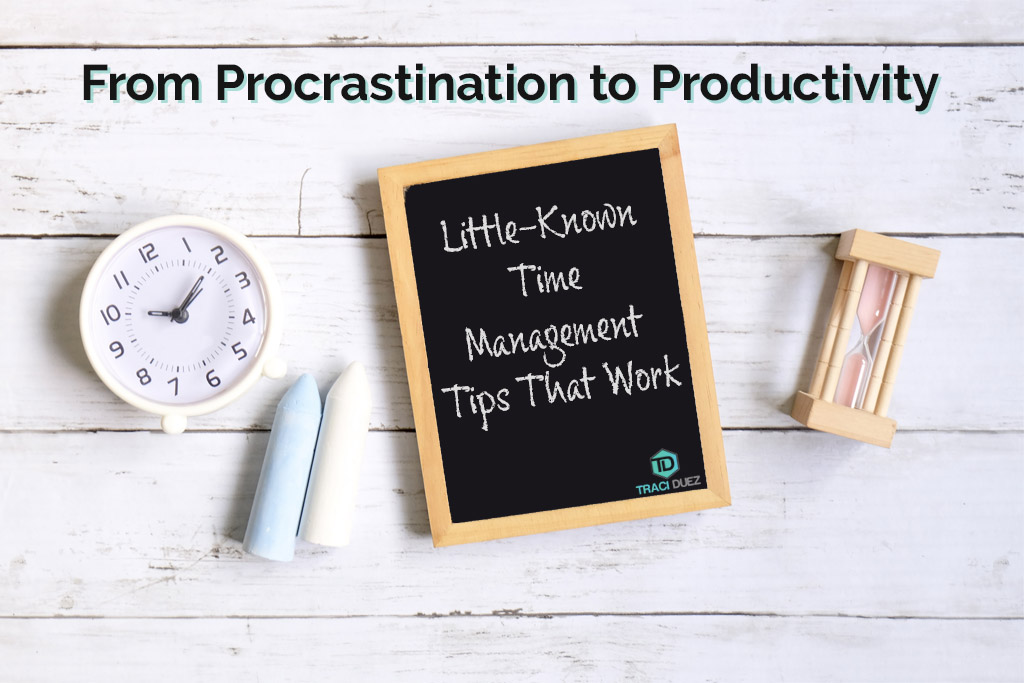Lately, it seems like time is moving faster than ever. There seems to be so much to do and not enough time. Then again, sometimes there is so much to do that you just sit and stare at all the things you have to do because you don’t know where to start. Has this ever happened to you?
Lately, it’s been happening to quite a few of my clients, so I thought I’d reach out to all of you with some little-known (although you may know them) time management tips.
I believe time is our most precious commodity, and professionals are always looking for ways to manage it more effectively. However, implementing time management techniques can be a challenge, and many professionals struggle to adopt new habits and make lasting changes. First, let’s talk about the tips and then address the challenges.
6 little-known time management tips
Here are five little-known time management tips that can help professionals use their time more efficiently:
- 🍅 Use the Pomodoro Technique: The Pomodoro Technique involves breaking your work into 25-minute intervals, followed by a 5-minute break (or 45 minutes with 10-15 minute breaks). This method helps you stay focused and energized throughout the day. This is especially helpful if you find your energy drained by your afternoon. Bonus tip: Do something to get moving during your break. Take a walk, do a few squats, stretch your whole body, swing your arms in circles… yes, it will look weird if someone is watching – and that someone will also watch you become more successful and productive. 😉
- 🧾 Keep a time log: Keeping a log of how you spend your time can help you identify areas where you may be wasting time. However, accurately tracking your time can be a challenge, especially if you have a lot of interruptions throughout the day. So, try to use your calendar to track your time, not just schedule it. If you had a block of time set for working on your plan and you used it to meet with someone – document the meeting and move the planning to another spot.
- 🪣 Batch similar tasks: Grouping similar tasks together can help you avoid context switching and save time. However, it can be difficult to prioritize tasks and decide which ones to tackle first. Looking at the batches of tasks can often help you to recognize what types of tasks you’ve been procrastinating and allow you to prioritize those to knock them off your plate and feel a real sense of accomplishment.
- 📦 Use time blocking: Instead of having a to-do list, schedule specific blocks of time for each task. This technique helps you stay focused and committed to completing each task within the allotted time. However, estimating the time required for each task can be difficult, leading to over-commitment and missed deadlines. If you’ve been feeling overcommitted, time blocking can really help you learn how long your work actually takes. It can be shocking at first but don’t beat yourself up. Adjust your time allotments, stay focused on the outcomes you desire, and just get a little bit better at estimating and time blocking every day.
- 🔻 Minimize distractions: Oh, this can be a touchy one. Eliminating or reducing distractions can help you stay focused and be more productive. However, interruptions and distractions are often beyond your control, making it challenging to stay on task. Find ways to set boundaries, yes, even physical boundaries. Need to concentrate? Go to the library or coffee shop. Close your door. It’s OK to be ‘selfish’ and find your space.
- 🔑 Know & Understand Your Key Outcomes: Do you have clarity around your role and how you’re being measured? So, many folks that I work with are not sure of their key responsibilities. They ask their supervisor or lead and find that their lead doesn’t know how they are measured. It can be crazy. Rather than feeling discouraged, take charge. YOU decide. What are your biggest goals for the next quarter? next month? next week? Look at these every Friday end-of-day, or Sunday evening, or first thing Monday morning. Don’t skip this step! Align your calendar with your “big 3” with time set aside to accomplish each.
Overall, implementing time management techniques requires discipline and dedication, and professionals must overcome several challenges to make lasting changes. Resistance to change, difficulty prioritizing tasks, interruptions and distractions, over-commitment, and lack of accountability are all common obstacles that professionals like you may face.
To overcome these challenges, you should start small and gradually implement new techniques into your routine. Experiment with different time management methods and find the ones that work best for you. Consider enlisting the help of a coach, mentor, or accountability partner to hold you accountable and provide support and guidance along the way.
Oh, one more really important tip:
Celebrate your accomplishments EVERY DAY!
What if you don’t get everything done? What do you have to celebrate? Well, you did something, didn’t you? Maybe it wasn’t what you intended, but you did do something. Celebrate that! Your brain loves celebration. It helps your brain learn to add value and focus on outcomes (yes, even unintended ones).
At the end of each day, capture what you accomplished and the value that you created with your time… the value for others and the value for you.
Time management is NOT about managing time
Effective time management is crucial for professionals who want to be productive and achieve their goals, and find a sense of fulfillment in their lives. And yet, it isn’t about managing time at all. It’s all about managing YOU!

